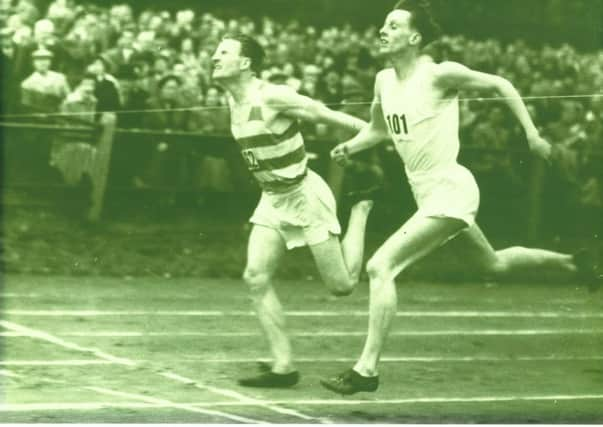Obituary: Bobby Quinn, talented Scottish track athlete turned respected official


Bobby Quinn was one of Scotland’s leading track athletes in the 1950s and later a well known and highly regarded official. A sprinter whose range extended from 100 to 440 yards, he twice won national championships in the latter event while collecting three silver medals at 220 and a bronze in the 100. Proudly sporting the colours of Glasgow’s Victoria Park, he was an important member of their highly successful relay teams with whom he claimed 15 national championship medals, 12 of them gold.
Although the team claimed medals at three relay events, the 4x110, 4x440 and Medley, they excelled in the short sprint version, winning seven consecutively from 1951 onwards, with Bobby carrying the baton each time. He was the first to recognise the contribution of teammates of the calibre of Olympian Willie Jack, Ronnie Whitelock and Alan Dunbar among others, and the expert coaching of Willie McFarlane, former double Powderhall Sprint winner.
Advertisement
Hide AdAdvertisement
Hide AdBobby’s excellent form was recognised with the award of two international vests, in 1954 at London’s White City for a combined Scottish/Irish team against England/Wales and in 1957 for a match in Dublin against Ireland. Domestically, outwith national championships he also enjoyed success in front of huge crowds at many of the top meetings of the time, including Rangers Sports, Glasgow Police Sports, Glasgow Highland Games and Edinburgh Highland Games at Murrayfield, where at the latter he also featured in the Glasgow relay team against rivals from Birmingham, Manchester, Edinburgh etc.
After competing he took a break from the sport but later made an important contribution as an official for more than 30 years as both a committee member of Victoria Park and Secretary/Treasurer of the West District of the S.A.A.A. He was very involved in the preparations for the initial Glasgow Marathons and at the 1986 Edinburgh Commonwealth Games was transport co-ordinator. Later he officiated at the European Indoor Championships and the World Cross Country Championships, both in Glasgow. In 2014 he was delighted to be given the honour of carrying the Commonwealth Games baton along Paisley Road West, days before the opening ceremony.
On the track, seasons 1954 -56 were particularly memorable. In 1954 he was a member of the club’s relay teams which claimed gold in all three events in the national championships, a feat which it is understood has never been repeated. In the wake of these successes,the Scots Athlete magazine stated: “Quinn has been a sheet anchor in Victoria Park’s great relay teams where his courageous finishing efforts have frequently taken the tape from his opponent’s chest.” That season he also won his first individual national medals, at 100 and 220, with the club awarding him life membership for these achievements.
In 1955 and ’56 he won individual gold over 440 yards at the national championships, on both occasions against the much more fancied JV Paterson of Edinburgh University, who in 1957 would win the event at the World Student Games in Paris. The first of those races was described in Scots Athlete as “the toughest, closest and most exciting event of the championships... Paterson leading off the final bend but with 50 yards to go, Quinn closed the gap and his burly chest got to the tape first,” while his 1956 triumph was “a superbly judged effort,” from the outside lane.
An injury at work led to his retiral in 1958 – being highly competitive he only wanted to race if could give his best.
Robert Quinn was born in Detroit – the twin of Harry, also an athlete – to Benjamin and Elizabeth who had emigrated from the Gorbals a few years earlier for “a better life”. As the move coincided with the Depression, when Bobby was three they returned to Glasgow, where his father worked in various manual jobs. There were another five brothers, Benny – also born in USA – and Joe, John, Tony and James.The family initially lived in the Gorbals, then Drumoyne and latterly Penilee, with Bobby attending St Gerard’s school in Govan.
National Service in the Royal Electrical and Mechanical Engineers near Reading followed, during which his running career began. Once demobbed, Victoria Park’s distance running champion Ian Binnie, who worked with Harry, arranged for Bobby to join the club in about 1950, paving the way for athletic success.
He worked as a motor mechanic in Hillington, mostly for the Scottish Development Agency, and in 1957 married Marie Kilpatrick, also from Glasgow, whom he had met at “the dancing”. They enjoyed a happy marriage of almost 50 years until Marie’s death in 2007, and had five children, Robert, Tony, Elizabeth, John and James. In 2009 he married Anne, with whom he enjoyed his latter years, the couple regularly going on cruises to the Norwegian fjords and Mediterranean.
Advertisement
Hide AdAdvertisement
Hide AdIn retirement he took up bowling at Paisley’s Hawkhead Club, and another sporting interest was Celtic, where he had a season ticket. His faith as a member of Our Lady and St George’s Church was important and he assisted the St Vincent de Paul Society in the parish. He liked to make a contribution in every aspect of life and his humility and sense of fun endeared him to all. Over his final months he was extremely well cared for in Erskine Park Home.
He is survived by Anne, his sons, grandchildren and brothers John, Tony and James.
JACK DAVIDSON